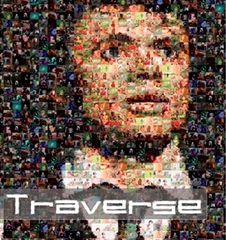CROSS OVER FROM ROUTINE AND VIVRE LE VIE
Napoleon’s vision to make the world his grand empire of France was stifled by his winter campaign in Russia and his defeat at Waterloo. However, what he may not have imagined is France’s prevailing influence in the world – not necessarily as a military superpower – but as arguably the foremost, respected pioneers (and keepers) of culture and art. The French consistently find new ways to recombine the available elements and generate something unique, distinct, and affecting. Whether it’s the palace of Versailles, Le Tour Eiffel, Victor Hugo’s Les Miserables, ballet, impressionism, surrealism, mime, film (thank Les frères Lumière for their invention) and more, these contributions endure because they are exquisite, inspirational, and reveal truths in a striking manner.
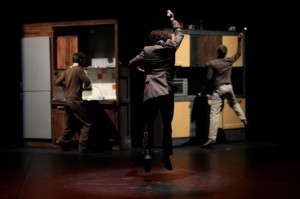 Last year, The Artist won an accumulation of awards for Best Picture, which is staggering considering that it is a nearly silent film that relied on the combination of endearing storytelling, a propulsive score, and the grand gamble to almost entirely rely upon the of-thought bygone art of pantomime. But a year before that widely heralded production even found its way to the big screen, Arcosm Company presented Traverse, a sixty-minute dance-music-theater production that combined all those elements and showcased them in a live theatre setting. From the first ringing bell to the ensemble’s last choreographed movement, the show is enjoyable, resonant, and intelligently realized. Directors Thomas Guerry and Camille Rocailleux tell a story through pantomime, movement, music, and dance; the quartet of performers are adroit at performing all these demanding duties, often at the same time. It continues its string of performances in France, but thankfully I was fortunate enough to catch its lone LA performance last Friday.
Last year, The Artist won an accumulation of awards for Best Picture, which is staggering considering that it is a nearly silent film that relied on the combination of endearing storytelling, a propulsive score, and the grand gamble to almost entirely rely upon the of-thought bygone art of pantomime. But a year before that widely heralded production even found its way to the big screen, Arcosm Company presented Traverse, a sixty-minute dance-music-theater production that combined all those elements and showcased them in a live theatre setting. From the first ringing bell to the ensemble’s last choreographed movement, the show is enjoyable, resonant, and intelligently realized. Directors Thomas Guerry and Camille Rocailleux tell a story through pantomime, movement, music, and dance; the quartet of performers are adroit at performing all these demanding duties, often at the same time. It continues its string of performances in France, but thankfully I was fortunate enough to catch its lone LA performance last Friday.
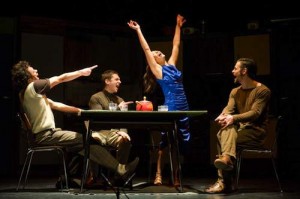 Traverse is a wonderfully executed tragicomic parable about the constant push and pull between the order of our ordinary lives and the enigma of our dark and beautiful dreams. Emilien Gobard plays the drably dressed, mundane man living alone in his flat. All he wants is to eat his meal, read his paper, laugh at the radio program broadcast (in Francais), and live his structured, solitary existence. However, people come in and out of the flat infringing upon his set ways and forcing him out of his comfort zone: His lovely blue dress-wearing neighbor (Anne-Cécile Chane-Tune, filled with verve and grace) needs a salt and pepper shaker; and a pink-suited salesman (Matthieu Benigno) rattles on and on. One early stirring sequence has all four dressed in dull browns, moving about as they utilize elements of the kitchen as percussion instruments – cupboards, chairs, tables, glasses, couch – demonstrating the same routine of tidying up in canon with one another. But it is after a halted dinner gathering, after our everyman decides he cannot share his holy crock-pot full of food (not even with his pretty neighbor), that his dreaming life truly takes over.
Traverse is a wonderfully executed tragicomic parable about the constant push and pull between the order of our ordinary lives and the enigma of our dark and beautiful dreams. Emilien Gobard plays the drably dressed, mundane man living alone in his flat. All he wants is to eat his meal, read his paper, laugh at the radio program broadcast (in Francais), and live his structured, solitary existence. However, people come in and out of the flat infringing upon his set ways and forcing him out of his comfort zone: His lovely blue dress-wearing neighbor (Anne-Cécile Chane-Tune, filled with verve and grace) needs a salt and pepper shaker; and a pink-suited salesman (Matthieu Benigno) rattles on and on. One early stirring sequence has all four dressed in dull browns, moving about as they utilize elements of the kitchen as percussion instruments – cupboards, chairs, tables, glasses, couch – demonstrating the same routine of tidying up in canon with one another. But it is after a halted dinner gathering, after our everyman decides he cannot share his holy crock-pot full of food (not even with his pretty neighbor), that his dreaming life truly takes over.
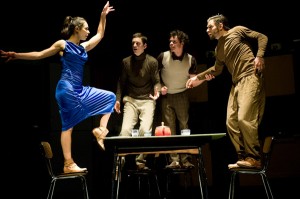 The set separates as he stands at the center like a maestro conducting an orchestra, faces the cupboards behind him, and orchestrates their syncopated movement with mere gesticulations. Then, dexterous and talented percussionists Alexandre Esperet and Benigno grab mallets and use the now separated kitchen as a drum set (the two also shine in a xylophone duet and handle their dancing with assurance). Later, a moving sequence involves his dream girl dancing and sliding beautifully from her bath at one end of the stage and our everyman seated in his comfy chair on the other. It is a graceful illustration that elucidates just how slippery and lovely our fantasies and desires can be. Towards the end of the piece, all four performers move about in backwards sequence and revisit the moment where he cannot share his crock-pot, and our everyman experiences the repercussions of his action illuminated in a different manner. He carries on his routine in pantomime, with his dream girl being tossed and thrown with each movement; she is mangled, maltreated, and ultimately ruined by our everyman’s rigidity to his structured reality. At the end of the piece all four performers execute the same kitchen routine of cleaning, preparing, and putting away, forever doing the same things – not together, but isolated.
The set separates as he stands at the center like a maestro conducting an orchestra, faces the cupboards behind him, and orchestrates their syncopated movement with mere gesticulations. Then, dexterous and talented percussionists Alexandre Esperet and Benigno grab mallets and use the now separated kitchen as a drum set (the two also shine in a xylophone duet and handle their dancing with assurance). Later, a moving sequence involves his dream girl dancing and sliding beautifully from her bath at one end of the stage and our everyman seated in his comfy chair on the other. It is a graceful illustration that elucidates just how slippery and lovely our fantasies and desires can be. Towards the end of the piece, all four performers move about in backwards sequence and revisit the moment where he cannot share his crock-pot, and our everyman experiences the repercussions of his action illuminated in a different manner. He carries on his routine in pantomime, with his dream girl being tossed and thrown with each movement; she is mangled, maltreated, and ultimately ruined by our everyman’s rigidity to his structured reality. At the end of the piece all four performers execute the same kitchen routine of cleaning, preparing, and putting away, forever doing the same things – not together, but isolated.
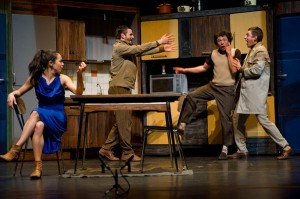 Emilien Gobard, the mundane everyman, is an exceptional, fluid and seamless mime, reminiscent of Jacques LeCoq’s playful openness. His handling of the crock-pot is a very funny moment, but even more impressive is his characterization and small mannerisms that not only make him human and endearing, but engaging and real. It is the symbiotic synergy of Guerry’s choreography and Rocailleux’s music, however, which generate the propulsive engine responsible for the ensemble’s exceptional performance. Rocailleux’s music, both live and tracked, is moody, rhythmic, and percussive; its inventive arrangements and subtle kaleidoscopic shifts complement Guerry’s choreography, which expresses the feelings of each personality while also communicating the story and the piece’s more comprehensive ideas. Arcosm Company’s sets and pieces are effectively utilized in ways both ordinary (brown and yellow tones) and surprising (cupboards which move on an unraveling set).
Emilien Gobard, the mundane everyman, is an exceptional, fluid and seamless mime, reminiscent of Jacques LeCoq’s playful openness. His handling of the crock-pot is a very funny moment, but even more impressive is his characterization and small mannerisms that not only make him human and endearing, but engaging and real. It is the symbiotic synergy of Guerry’s choreography and Rocailleux’s music, however, which generate the propulsive engine responsible for the ensemble’s exceptional performance. Rocailleux’s music, both live and tracked, is moody, rhythmic, and percussive; its inventive arrangements and subtle kaleidoscopic shifts complement Guerry’s choreography, which expresses the feelings of each personality while also communicating the story and the piece’s more comprehensive ideas. Arcosm Company’s sets and pieces are effectively utilized in ways both ordinary (brown and yellow tones) and surprising (cupboards which move on an unraveling set).
Supported by FLAX (France Los Angeles Exchange), Traverse is aimed for an all-ages audience, but while younger folks may have a difficult time engaging with the material, it deserves to be seen by all. The message of the piece is universal and ought to be taken to heart; sharing our lives and dreams together create excitement and harmony, but maintaining a commitment to a daily, self-serving routine generates a mechanical, lifeless existence. Are you willing to traverse? Are you daring enough to cross over? Or are you committed to staying in your comfort zone?
photos courtesy of Arcosm
Traverse
Arcosm Company at Theater Raymond Kabbaz in West LA
performed February 1, 2013
for upcoming events, visit http://www.theatreaymondkabbaz.com
for info on Arcosm, visit their site
